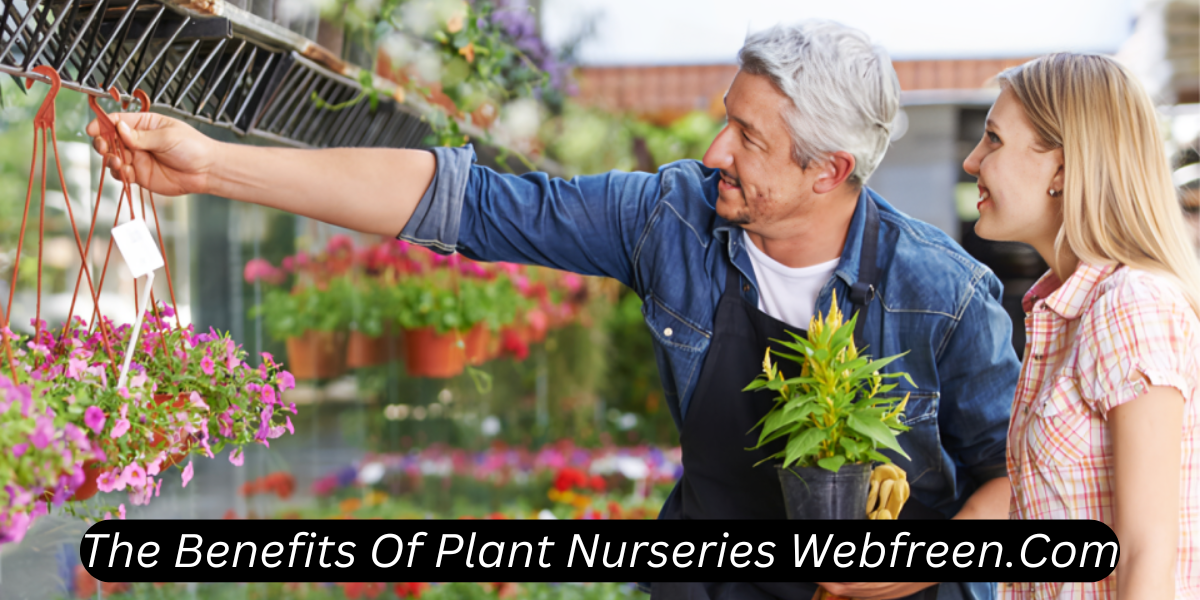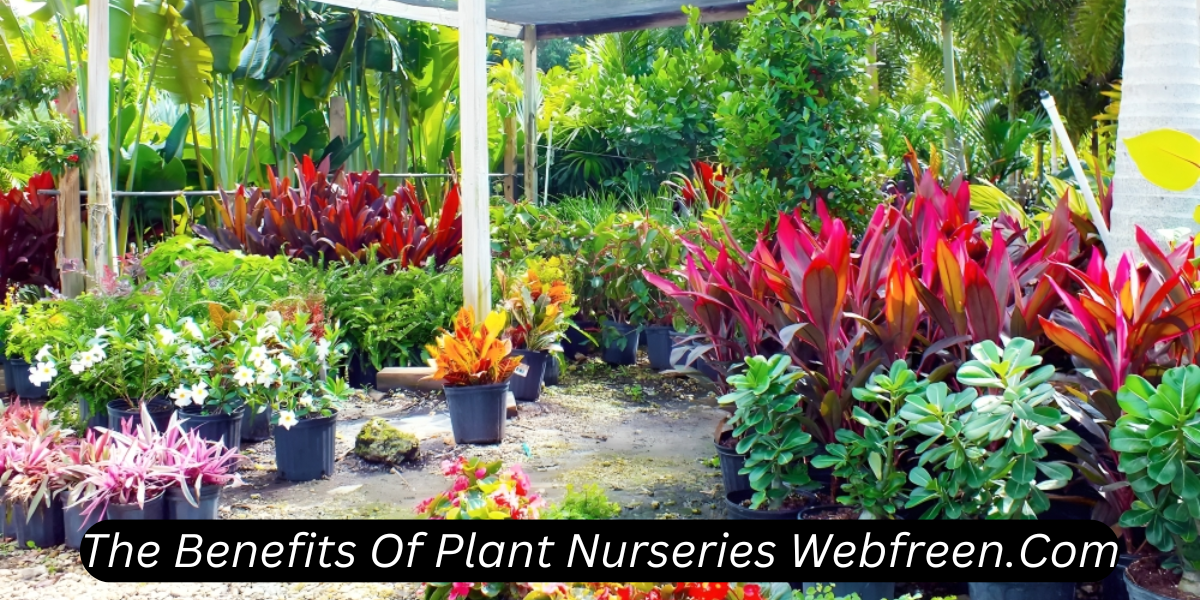
In this article, we’ll explore the many advantages of using plant nurseries, delve into the unique offerings of these businesses, and examine why supporting your local nursery is beneficial not only for your garden but also for the environment and community. With the help of Webfreen.com, we’ll also discuss how plant nurseries are adapting to modern gardening needs, providing not just plants, but knowledge, tools, and sustainability practices that help gardeners of all levels succeed.
What is a Plant Nursery?
A plant nursery is a specialized facility where plants are propagated, grown, and sold to customers. These nurseries are essential for gardeners, landscapers, and anyone interested in horticulture. At a nursery, plants are cultivated under controlled conditions to ensure they are healthy, disease-free, and ready for transplantation into a home garden, park, or commercial landscape.
Plant nurseries offer a wide range of plants, including flowers, trees, shrubs, herbs, and vegetables. They also provide seeds, bulbs, and saplings, making them a one-stop-shop for gardeners looking to fill their spaces with lush, vibrant greenery. Nurseries cater to both novice and experienced gardeners, offering tailored advice, plant care tips, and even design suggestions.
Why Are Plant Nurseries Important?
The importance of plant nurseries extends far beyond their role as plant providers. They are crucial to maintaining biodiversity, promoting sustainable gardening practices, and ensuring the long-term health of ecosystems. Plant nurseries contribute to environmental conservation efforts by offering native plants, which support local wildlife, and by advocating for organic and eco-friendly growing methods. Additionally, nurseries foster a sense of community, serving as educational hubs where gardeners can learn, share ideas, and collaborate.
In today’s world, where urbanization and industrial agriculture often threaten natural landscapes, plant nurseries are vital in preserving the diversity of plant life and ensuring that home gardens can thrive in harmony with their environments. By sourcing plants from nurseries, gardeners can make more informed, sustainable choices that contribute to the health of their local ecosystem.
Expert Advice and Guidance
One of the most significant advantages of purchasing plants from a nursery is access to expert advice and guidance. Unlike large chain stores or online platforms, where plant care information may be limited to basic instructions, nurseries are staffed by professionals with extensive knowledge of horticulture. These experts can provide detailed advice on everything from plant selection to soil preparation and pest control, ensuring that you have the best possible chance of success with your garden.
Whether you are a novice gardener or have years of experience, the advice offered by nursery staff can be invaluable. They can help you choose plants that are best suited to your specific conditions, such as soil type, climate, and exposure to sunlight. They can also guide you on the correct watering and fertilization techniques, ensuring that your plants thrive.
Personalized Recommendations
One of the unique features of plant nurseries is their ability to offer personalized recommendations based on your garden’s specific needs. For instance, if you live in an area prone to drought, nursery staff can recommend drought-resistant plants, such as succulents or native species, that require minimal water. If you’re a beginner, they might suggest low-maintenance plants like ferns or snake plants that are easy to care for and resilient to common issues.
Additionally, nurseries often have extensive knowledge of local conditions, meaning they can advise on plants that will thrive in your area. They can help you avoid common pitfalls, such as choosing plants that are not suited to your region’s climate or soil type, and suggest alternatives that will work better in your specific environment.
High-Quality Plants
When you buy from a plant nursery, you can be confident that the plants you’re purchasing are of the highest quality. Unlike plants sold at large retailers, which are often mass-produced and may have been subjected to poor growing conditions, nursery plants are typically grown with care and attention to detail. This results in healthier, more robust plants that are more likely to thrive once transplanted into your garden.
Reduced Risk of Disease
Nurseries take great care to ensure that their plants are free from disease and pests. Plants grown in nurseries are often monitored closely and subjected to regular health checks to ensure they are in optimal condition. This reduces the risk of introducing diseases or pests into your garden, which can have devastating consequences for your plants.
By purchasing plants from a nursery, you can avoid the disappointment and frustration of buying a plant that is already sick or infested. Healthy plants are more resilient and will grow more quickly, resulting in a more successful and satisfying gardening experience.
Diverse Selection of Plants
Plant nurseries offer a much broader selection of plants than you would typically find at a large retailer or home improvement store. Whether you are looking for rare species, native plants, or specialized varieties, nurseries have the diversity to meet your needs. From ornamental plants to edible crops, the variety is vast, allowing gardeners to find exactly what they’re looking for.
Native and Region-Specific Plants
One of the key benefits of shopping at a nursery is access to plants that are native or well-suited to your specific region. Native plants are adapted to the local climate and soil conditions, making them more resilient and easier to grow. They also provide important habitat for local wildlife, such as birds, insects, and pollinators, which play a crucial role in maintaining a healthy ecosystem.
Nurseries often carry a wide selection of native plants, making it easy for gardeners to choose species that will thrive in their environment. This is particularly important for those looking to create a sustainable garden, as native plants require less water, fertilizer, and pesticides than non-native species.
Eco-Friendly Practices
Many plant nurseries are committed to eco-friendly practices, making them a great choice for environmentally conscious gardeners. These nurseries often use organic fertilizers, practice water conservation, and employ sustainable methods of plant propagation. By purchasing from a nursery that prioritizes sustainability, you can feel confident that you are making a positive contribution to the environment.
Locally Sourced Plants
In addition to growing their plants in eco-friendly ways, many nurseries also source their plants locally. This reduces the carbon footprint associated with transporting plants over long distances and supports local growers and businesses. By buying locally sourced plants, you can reduce your environmental impact and contribute to a more sustainable gardening industry.
Support for Local Businesses
When you purchase plants from a nursery, you are not just buying plants; you are supporting a local business that plays an important role in your community. Nurseries often rely on the patronage of local customers to thrive, and in return, they offer high-quality plants, personalized service, and expert advice.
Building Relationships with Experts
Many gardeners develop long-lasting relationships with their local nursery staff, who become trusted advisors on all things gardening. These relationships can be incredibly valuable, especially for beginners who need guidance on how to care for their plants or troubleshoot problems. Nursery staff are often passionate about gardening and enjoy sharing their knowledge with customers, making the shopping experience not only educational but enjoyable as well.
Specialized Tools and Supplies
In addition to plants, nurseries also offer a wide range of gardening supplies, from tools and fertilizers to pots and soil. This makes them a one-stop-shop for all your gardening needs. Whether you need specialized tools for planting or organic fertilizers for feeding your plants, a nursery will have what you need.
One-Stop Gardening Shop
Instead of running around to different stores to get your supplies, nurseries allow you to get everything in one place. This convenience is especially beneficial for busy gardeners who don’t have time to visit multiple locations. Additionally, because nurseries are focused on gardening, the products they carry are often of higher quality than what you would find at a general retailer.
Plant Nurseries as Educational Resources

Plant nurseries serve as educational hubs for gardeners. Many nurseries offer workshops, classes, and other educational resources for their customers. Whether you’re a beginner learning the basics of plant care or an experienced gardener looking to expand your knowledge, nurseries provide valuable learning opportunities.
Learning Opportunities for All Levels
Many nurseries host events such as gardening workshops or plant care seminars, where gardeners can learn more about topics ranging from landscape design to plant propagation. These events are often tailored to different skill levels, ensuring that there is something for everyone.
Additionally, nurseries often have informational materials available, such as brochures or guides, that customers can take home with them. These materials can be a valuable resource for gardeners, providing step-by-step instructions on how to care for their plants.
Stress-Free Shopping Experience
Shopping at a plant nursery is a far more relaxed and enjoyable experience than shopping at a large retail store. Nurseries often have peaceful, garden-like settings where customers can take their time exploring the different plants and products on offer.
A Relaxing, Nature-Inspired Environment
Many nurseries are designed to be inviting and calming spaces, with plants displayed in beautifully landscaped settings that inspire gardeners to imagine what their own garden could look like. This tranquil environment allows you to shop at your own pace and make well-informed decisions about the plants you purchase.
Contributing to Environmental Conservation
By purchasing plants from a nursery, you are supporting environmental conservation efforts. Many nurseries partner with local and national organizations to promote biodiversity, encourage sustainable gardening practices, and protect native plant species.
Supporting Biodiversity
Nurseries play a critical role in maintaining biodiversity by offering a wide range of native plants and educating gardeners on the importance of planting for wildlife. By choosing plants that support local ecosystems, such as native flowers that attract pollinators or trees that provide habitat for birds, gardeners can help ensure the long-term health of their environment.
For More Information Visit: Peace Magazines
Conclusion
Plant nurseries offer countless benefits to gardeners of all experience levels. From high-quality plants and expert advice to eco-friendly practices and a diverse selection of species, nurseries are an invaluable resource for anyone looking to cultivate a beautiful, thriving garden. By supporting your local nursery, you are not only improving your garden but also contributing to environmental conservation and community development.
With the help of resources like Webfreen.com, gardeners can connect with top-quality nurseries that provide the tools, plants, and knowledge necessary for gardening success. Whether you are a seasoned pro or a novice just starting, plant nurseries are an essential part of the gardening journey.
FAQs
1. What is a plant nursery?
A plant nursery is a facility where plants are propagated, grown, and sold. It offers a wide range of plants such as flowers, trees, shrubs, and vegetables, as well as gardening supplies and expert advice to help gardeners thrive.
2. Why should I buy plants from a nursery instead of a big retailer?
Nurseries offer high-quality, well-cared-for plants, personalized advice, and a diverse selection of species. The staff are experts who can help you choose plants best suited to your garden’s specific conditions.
3. How do plant nurseries support sustainable gardening?
Many nurseries focus on eco-friendly practices such as organic growing methods, water conservation, and offering native plants that support local ecosystems. This makes them a great choice for environmentally conscious gardeners.
4. What types of plants can I find at a nursery?
You can find a broad variety of plants at a nursery, including ornamental flowers, fruit and vegetable plants, trees, shrubs, herbs, and region-specific or native plants.
5. Can nursery staff help me choose the right plants for my garden?
Yes, nursery staff are usually knowledgeable and can provide tailored advice on selecting plants that match your garden’s soil, climate, and sunlight conditions. They can also offer guidance on plant care.
6. Are nursery plants healthier than those from other sources?
Yes, plants from nurseries are typically healthier because they are grown under controlled conditions and regularly checked for pests and diseases. This ensures you get high-quality, disease-free plants.
7. Do plant nurseries offer gardening tools and supplies?
Yes, many nurseries are one-stop shops, offering not only plants but also a variety of gardening tools, organic fertilizers, pots, soil, and other supplies needed for successful gardening.
8. How can I find a reputable plant nursery near me?
You can use resources like Webfreen.com to locate trusted local nurseries that offer high-quality plants, sustainable practices, and expert advice tailored to your gardening needs.







